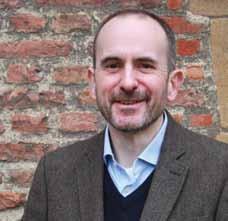
3 minute read
Fellows’ News
Dr Watkins wins Pilkington Prize
Dr Carl Watkins, Tutor and University Senior Lecturer in Medieval History, has been recognised for his outstanding quality and approach to teaching and named as one of the winners of this year’s Pilkington Prizes. He works on religious culture in the central and later Middle Ages, especially on beliefs about, and conceptualisations of, the supernatural. He has written about concepts of sinfulness and the emergence of purgatory, has completed a book for Cambridge University Press which explores beliefs about the supernatural in a medieval English context and has, more recently, explored beliefs about the dead during the middle ages in The Undiscovered Country: journeys among the dead, Bodley Head (2013).
Advertisement
The Pilkington Prizes were inaugurated in 1994 and endowed by Sir Alastair Pilkington to acknowledge excellence in teaching. The prizes are awarded annually to inspirational academics who make a substantial contribution to the teaching programme of a Department, Faculty or the University as a whole. There are twelve prizes awarded annually by the Vice- Chancellor with nominations made by each school.
Professor Neil Rushton
Professor Neil Rushtonis to become a “Fellow of International Orthopaedic Research” (FIOR), Emeritus”. The FIOR is a very exclusive honorary status awarded by ICORS, which has represented 11 worldwide orthopaedic research societies since 1992. It recognises individuals who gained a status of excellent professional standing and high achievements in the field of international orthopaedic research and have shown sustained commitment to international, and in particular global, collaboration and society life.
Prof Rushton has been working to elucidate the reasons for failure of total joint replacements since the early eighties. He was first to describe the involvement of polyethylene wear particles in the process of aseptic loosening (the most common cause of failure). He has designed a hip system that reduces the bone loss owing to stress shielding.
This recent honour is the latest recognition of his work. In the past he was awarded a Hunterian Professorship of the Royal College of Surgeons of England and the Chapman Medal of the institute of Materials, Minerals and Mining together with an invitation to become a Fellow of the organisation.
Dr Gareth Atkins
Dr Gareth Atkins, Senior Research Fellow and Joint Director of Studies in History, will be publishing an edited volume, Making and Remaking Saints in Nineteenth-Century Britain, with Manchester University Press during Easter Term. He is also organising a series of lunchtime talks and an evening concert, to take place in May and June in the Fitzwilliam Museum, ‘The Bible and Antiquity in Nineteenth- Century Objects’.
For details, and to book, see www.fitzmuseum.cam.ac.uk/calendar/whatson
Dr Emily So
Dr Emily So, Director of Studies in Architecture, University Senior Lecturer in Architectural Engineering and Director of the University’s Centre for Risk and the Built Environment was recently interviewed by the BBC World Service Inquiry Programme on whether it is possible to earthquakeproof a city. She explained that different types of buildings around the world have differing collapse mechanisms which depend on the roof types and the particular environments the buildings are in. In drier climates, for example, roofing structures tend to be much lighter so that these, despite collapsing during earthquakes, do not tend to crush people to death. Her work is focussed on these subtleties and discussed in her most recent book Estimating Fatality Rates for Earthquake Loss Models published by Springer: www.springer.com/gp/ book/9783319268378
New Fellows
Dr Adam Coutts
Dr Adam Coutts is the Mellon Fellow in Public Policy in the Department of Politics and International Studies. His research focuses on the links between public policy, health and wellbeing in the United Kingdom, Europe and the Middle East and North Africa. He is a former graduate student of the College and a Teaching Bye-Fellow.
Visiting Fellow
Professor Wei Li
Professor Wei Li is this year’s YIP (Chinese) Visiting Fellow to July 2016. He is Professor in the School of Physics, Huazhong University of Science and Technology (HUST for short), and is a leading expert on metal-organic framework materials (“Mof’s”). HUST is one of the best universities in China, well known in the fields of engineering, medicine and natural sciences with 55,000 students and is based in Wuhan.
www.magd.cam.ac.uk










